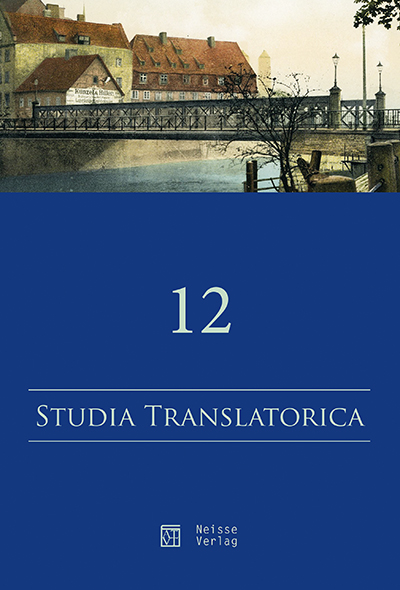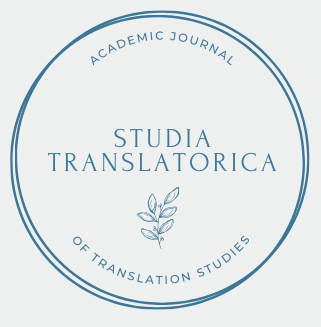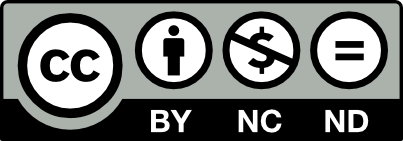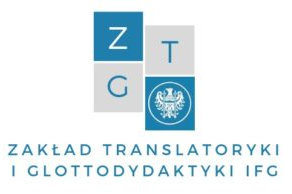
Studia Translatorica
Heft 12 (2021): Komunikacja w translacji – translacja w komunikacji. Kommunikation in der Translation – Translation in der Kommunikation. Communication in Translation – Translation in Communication
Herausgegeben von: Anna Małgorzewicz, Patricia Hartwich
Die Übersetzungspolitik der Französischen Revolution: Europäische Mehrsprachigkeitspolitik ante litteram? / The translation policy of the French Revolution: A European policy of multilingualism ante litteram?
DOI: 10.23817/strans.12-1 (online zugänglich: 2021-11-11)
Datum der Einreichung: 2021-04-22
Datum der Annahme zum Druck: 2021-07-05
Schlüsselwörter: translation policy, language policy, multilingualism, French Revolution, European Union
The language policy of the French Revolution is known today especially for the imposition of the national language and the oppression of the regional languages in France. In my contribution, I want to focus on a less known aspect: the translation policy. From 1790 on, several decrees stipulated the translation of national laws and decrees into the regional languages in France and other European languages. I will compare this translation policy with the policy of multilingualism within the institutions of the European Union. I will argue that there are some interesting similarities and some major differences.
Translationshandlung an der Schnittstelle zwischen philosophisch-praxeologischen Ansätzen und der Konzeption des erweiterten Translationsgefüges / Translation action at the interface of philosophical-praxeological approaches and the concept of the expanded translation setting
DOI: 10.23817/strans.12-2 (online zugänglich: 2021-11-11)
Datum der Einreichung: 2021-06-27
Datum der Annahme zum Druck: 2021-07-05
Schlüsselwörter: human action, translation action, translation strategy, translation purpose
The paper discusses the structure of a translation action. The concept of a linguistic action proposed by Jerzy Żmudzki within the model of the expanded translation setting offers a starting point for this discussion. The above-mentioned concept was confronted with other function-oriented translation models and with philosophical-praxeological concepts of human action. By referring to Aristotle’s philosophical concepts, it was possible to determine elements of human action categorized by Żmudzki on the basis of his empirical research. To describe the translation action, it was also important to analyze praxeological models explaining the reality changed by a particular action. Elements that emerge from these models have a fundamental meaning for the construction of a translation strategy. This has been empirically proven in research carried out by Żmudzki. The paper provides conclusive arguments for the necessity of perceiving translation as a strategically conditioned linguistic action. Such a concept of translation should form the basis for determining of translation teaching aims.
„Djangan, njô… tida boleh njô!” – Zu den Translationsmodalitäten im Hinblick auf Elemente der dritten Kultur / “Djangan, njô… tida boleh njô!” – On the translation modalities with regard to the third culture elements
DOI: 10.23817/strans.12-3 (online zugänglich: 2021-11-11)
Datum der Einreichung: 2021-06-04
Datum der Annahme zum Druck: 2021-07-05
Schlüsselwörter: translation modalities, fidelity, freedom, foreignness, third culture elements
The present article aims to scrutinize the translators’ strategic approaches to the third culture elements. The analysis is being conducted in the light of the translation modalities according to Żmudzki (2015a; 2015b): the possible fidelity to the source-text and the necessary freedom from the source-text. For this purpose the novel “Rubber” (1931) written by the Dutch writer Madelon Székely-Lulofs and its renderings into English (1933) by Gustaaf Johannes Renier and Irene Clephane and into German (1934) by Walther Hjalmar Kotas have been analysed. The confrontative analysis of the translation techniques used with regard to the third culture elements shows two different approaches of the translators. Furthermore, in case of the English rendering the question arises, whether the limit of the necessary freedom from the source-text has not been exceeded, i.e. whether the English version can still be considered a translation or rather an adaptation.
Adresatywne ukierunkowanie translacji w tłumaczeniu komedii audiowizualnych / Addressee-oriented approach in translation of audiovisual comedies
DOI: 10.23817/strans.12-4 (online zugänglich: 2021-11-11)
Datum der Einreichung: 2021-05-23
Datum der Annahme zum Druck: 2021-07-05
Schlüsselwörter: anthropocentric translation studies, addressee, recipient, translation of comedies, cultural reference
This paper discusses the subject of an addressee in a translation setting as understood by Jerzy Żmudzki. In this anthropocentric approach, translation addressees possess particular set of skills and specific knowledge that translators need to take into consideration. Since texts aren’t translated just for the sake of translation as an activity, translated texts should be perceived as messages that are meant for specific people. At the beginning of the paper, terms “addressee” and “recipient” are distinguished. Then, the author discusses what kind of information about addressees translators need to analyse before coming up with their translation. Furthermore, specific examples are examined in order to illustrate how addressees’ knowledge, preferences, and understanding of source culture should be taken into consideration by translators. All examples have been taken from audiovisual material, specifically from audiovisual comedies. The shows/films include “Gilmore Girls”, “Shrek”, “Shrek 2”, “How I Met Your Mother”, “2 Broke Girls”, “The Big Bang Theory”, “Modern Family”. The author pays attention also to the challenges of audiovisual translation in regard to the discussed topic. Taking into consideration all qualities of target addressees for whom the translation is being made is important when it comes to ensuring quality of the translation and fulfilling communicative function of the translated text.
Ein Plädoyer für die Vermittlung von Aussprachekompetenz in der Dolmetscherausbildung / Making the case for the teaching of pronunciation skills in interpreter training programmes’
DOI: 10.23817/strans.12-5 (online zugänglich: 2021-11-11)
Datum der Einreichung: 2021-03-05
Datum der Annahme zum Druck: 2021-07-05
Schlüsselwörter: oral communication, foreign accent, teaching of pronunciation, professional interpreter training, phonetic comprehensibility
Interpreting situations are, by definition, anchored in oral performance and must be understood as whole communicative events which are constituted at verbal, paraverbal and nonverbal levels. In the – per se intercultural – interpreting situation, transfer into the foreign language may well mean that one is confronted with a foreign accent. Although accent-free pronunciation is not an institutional requirement for professional interpreters in Poland, nonetheless, given that the aim of interpreting is the smooth functioning of a comprehensive processes, they are certainly expected to demonstrate a high level of comprehensibility when transmitting information orally. Against this background, this contribution makes the case for the targeted, institutionally guaranteed teaching of pronunciation skills as part of professional interpreter training. In this context, the discussion will explore which concrete aspects should be systematically addressed in the first place, and which methodology is appropriate. In intercultural interpreting scenarios phonetic comprehensibility is the primary and most basic prerequisite for understanding orally transmitted content and this objective should therefore be prioritized.
Die Behandlung defekter Ausgangstexte im Rahmen des Gerichtsdolmetschens und –übersetzens in der Slowakei / Management of defective source text in the framework of court interpretation and translation in Slovakia
DOI: 10.23817/strans.12-6 (online zugänglich: 2021-11-11)
Datum der Einreichung: 2021-03-20
Datum der Annahme zum Druck: 2021-07-05
Schlüsselwörter: court interpreting, court translation, defective source text, concept “Garbage in, garbage out” in translation, interpreting and translation strategy
The management of errors or defects of the source text is limited by the provisions of the Act on Experts, Interpreters and Translators in force in the Slovak Republic. The translator can choose different approaches, while it must be oriented according to the communicative situation, follow the requirements of the client – from the principle of “garbage in, garbage out” to active error correction. The fact that it is an (oral) interpretation or a (written) translation can also play an important role. All options have pitfalls and the choice of a solution requires a dynamic approach and an experienced translator. This paper deals with defects and errors in the source text in court interpretation and translation, especially in the conditions defined by the legislation of the Slovak Republic. It presents professionally satisfactory solutions from the point of view of the interpreter and translator, as well as the expectations of judges, which are the results of surveys.
Cognitive development and humor processing in children – how knowledge on children’s capacity to detect and interpret humor can suport the translator in the translation process / Cognitive development and humor processing in children – how knowledge on children’s capacity to detect and interpret humor can support the translator in the translation process
DOI: 10.23817/strans.12-7 (online zugänglich: 2021-11-11)
Datum der Einreichung: 2021-02-15
Datum der Annahme zum Druck: 2021-07-05
Schlüsselwörter: humor, mind, translation, developmental psychology, children’s literature
In my article, based on the research carried out by Jean Piaget and Paul McGhee (and others), I would like to focus on how children understand humor at different stages of their psychological development. Such knowledge on developmental psychology can turn out indispensable while translating humor in the literature devoted to children. Younger children will appreciate linguistic humor based on phonological ambiguity as they like playing with sounds. Early school children will recognize ambiguous word meanings and therefore will be able to enjoy semantic dimensions of the humorous texts. The theoretical part of the article will be supported by some examples of translations of wordplays from English into Polish and Portuguese in European and Brazilian versions taken from “Alice in Wonderland” by Lewis Carroll.
A Cognitive Linguistic account of the translator’s sociocultural situatedness and its role in the translation of a medieval devotional text into Present-Day English / A Cognitive Linguistic account of the translator’s sociocultural situatedness and its role in the translation of a medieval devotional text into Present-Day English
DOI: 10.23817/strans.12-8 (online zugänglich: 2021-11-11)
Datum der Einreichung: 2021-04-15
Datum der Annahme zum Druck: 2021-07-05
Schlüsselwörter: Cognitive Linguistics, Julian of Norwich’s “Revelations of Divine Love”, the translator’s sociocultural situatedness, Translator Studies
The Cultural Turn in Translation Studies sparked researchers’ interest not only in the translation as a cultural and sociological phenomenon, but also in the translator as an agent, rather than a figure who should fade into invisibility. Accordingly, the translator’s cognitive activity is seen as situated in their physical, social and cultural environment. The paper adopts a Cognitive Linguistic approach to the translator’s sociocultural situatedness, showing how it may bear on the translator’s linguistic choices. The paper concludes that to obtain a complete picture of the translator’s activity, it is necessary to illuminate and explore the interconnection of language, cognition and culture.
Przekład niemieckojęzycznych feminatywów w regulacjach prawnych na język polski / Translating German-language feminatives in legal regulations into Polish
DOI: 10.23817/strans.12-9 (online zugänglich: 2021-11-11)
Datum der Einreichung: 2021-03-02
Datum der Annahme zum Druck: 2021-07-05
Schlüsselwörter: the language of law, feminization of language, translation strategies, feminatives
The masculine names used in legal regulations make women invisible. Since the 80 years of the last century, the process of their de-masculinization has begun in German-speaking countries. The first part of the article discusses the statutory regulations guaranteeing gender symmetry in the language of law and administration in Switzerland, Germany, Austria and its consistent application. The legal status in this matter in Poland is completely different. It preserves the androcentric character of the Polish language of law and thus excludes the possibility of using feminatives in personnel documents or administrative decisions. The second part of the article examines the possibilities of translating the feminine forms of names of the addressees of legal norms into Polish. In the translational literature, this topic is not taken into consideration There are no rules for their translation in translational guides. The article presents two translational approaches and their effects, because they either violate the principle of fidelity of translation or the nomination used in Polish. The specific problems of translating feminatives into this language result from systemic limitations in their creation, strong stylistic characteristics and the continuing tendency to masculinize the titles and names of professions in Poland.
Przekład formuł słownych w tekstach prawodawczych, traktatowych i praktyki prawniczej / Translation of word formulas in legislative as well as treaty texts and legal practice
DOI: 10.23817/strans.12-10 (online zugänglich: 2021-11-11)
Datum der Einreichung: 2021-04-13
Datum der Annahme zum Druck: 2021-07-05
Schlüsselwörter: legal language, formulaic expressions, translation, documentary translation
Legal, judicial, notarial or administrative texts are characterized by a high level of linguistic standardization. It is determined by tradition and regulations that impose the structure of texts, the use of appropriate terminology and the linguistic shape of specific contents. The linguistic exponents of standardization are ready-made, repetitive and reproducible verbal formulas. They are characterized by stability on the lexical and syntactic plane, constant position in the text, occurrence in similar communicative situations. Quantitative research confirms the high saturation of legal texts and legal practice with repetitive strings of words. Before formulating the rules for the translation of verbal formulas in the language of law, the recommendation of the legal and linguistic services responsible for the correct and uniform translation of international treaties and legal acts and the views of translation theorists are presented. They are extremely divergent in this matter. The arguments cited and the examples of defective translations suggest that the translation of legal formulas should be guided by functional equivalence, even if they differ on the lexical and syntactic levels, as long as they concern comparable procedural activities. An important issue in their translation is the ability to identify a given sequence of words as formulaic expressions.
Gezähmt in Translation. Typographische Elemente in der Übersetzung der Graphic Novel „Kinderland“ ins Polnische / Polished in translation. Typographic aspects of the translation of a graphic novel “Kinderland” into Polish
DOI: 10.23817/strans.12-11 (online zugänglich: 2021-11-11)
Datum der Einreichung: 2021-03-30
Datum der Annahme zum Druck: 2021-07-05
Schlüsselwörter: translation of a comic book, typography, graphic novel, emotions in translation
In the art of comics, emotions are conveyed both on the linguistic and graphic level. On the graphic level, the emotional purport of the text is visualized by means of typography. This medium – characteristic mainly of comic books – is capable of communicating a whole range of information. The font, its proportions and direction, as well as spacing and outline of letters, enable the reader to understand and even share in the emotions of characters, expressing the intensity, tone and modulations of their voice. However, unreflective employment of typographic components, or their omission – intentional or not – from the process of translation may lead to translatorial modifications, and, what follows, misinterpretations, which influence the reception of the translated work in the recipient culture. The present text will analyze the Polish translation of the German graphic novel “Kinderland”, paying particular attention to the typographic aspects of the work.
O problemie tłumaczenia neologizmów na przykładzie bajki „The Smeds and the Smoos” Julii Donaldson oraz Axela Schefflera w jej niemieckim i polskim przekładzie / On translation of some neologisms on the example of the fairy tale „The Smeds and the Smoos” by Julia Donaldson and Axel Scheffler and its German and Polish renditions
DOI: 10.23817/strans.12-12 (online zugänglich: 2021-11-11)
Datum der Einreichung: 2021-03-17
Datum der Annahme zum Druck: 2021-07-05
Schlüsselwörter: neologisms, translation, translation techniques, child literature, poetry
The author focuses his attention on the analysis of translation techniques of some neologisms in the fairy tale “The Smeds and the Smoos” and describes different problems that may occur while translating these lexical units. In the theoretical part the author focuses on the classification of neologisms and on the description of translation techniques with reference to Polish, German and English studies. In the paper, the methods of translating neologisms proposed by inter alia Peter Newmark, Anja Schüler, Zygmunt Tęcza and Piotr Sulikowski are discussed. Later, in the analytical part the focus is put on the description of the translation of neologisms contained in the children’s fairy tale “The Smeds and the Smoos”, written by Julia Donaldson and Axel Scheffler, which is very popular in Poland and Germany. The translation units analyzed were grouped according to Peter Newmark’s typology and Piotr Sulikowski’s typology of techniques used with regard to translating neologisms. The examples described include the translation of neosemantisms, compounds and derivative forms. The paper concludes by emphasizing the fact that the Polish version of the English source text is more creative in translation than the German version. The translator who prepared the Polish text more often used less standard equivalents, which, however, were not less faithful to the original text. In the German translation, on the other hand, more omissions were found. It should be noted, however, that the number of pragmatically inadequate equivalents found in the German and Polish translations is the same, which leads to the hypothesis of a qualitative similarity between the Polish and German translations.
Językowe eksperymenty Jacka Dukaja i ich odzwierciedlenie w przekładzie (na materiale powieści „Perfekcyjna niedoskonałość”) / Jacek Dukaj’s linguistic experiments and their reflection in the translation (on the material of the novel “Perfect imperfection”)
DOI: 10.23817/strans.12-13 (online zugänglich: 2021-11-11)
Datum der Einreichung: 2021-03-22
Datum der Annahme zum Druck: 2021-07-05
Schlüsselwörter: translation, Polish science fiction, Perfect imperfection, linguistic experiments, Dukaj
This article is devoted to the problem of translating science fiction. Such problems are usually determined by the fact that the texts of this genre are repleted with scientific terminology, descriptions of new technologies and their application. The world depicted in fantastic literature has a typical ontological status. In order to achieve the desired adequacy, the translator must demonstrate not only knowledge of the principles of fiction translation but also additional competencies. The material for the analysis comes from the novel “Perfect imperfection” by Jacek Dukaj is an example of science fiction literature, orientated to technological progress ideas. This novel can be studied in a multifaceted way. In this article, however, the research area has been narrowed down to some linguistic innovation and language games, which will be analyzed in the Polish-Russian translation aspect.
„Napój ananasowy dla pięknej damy” Wiktora Pielewina w polskim przekładzie. Wybrane aspekty / “Pineapple Water for the Fair Lady” by Victor Pelevin in Polish translation. Selected aspects
DOI: 10.23817/strans.12-14 (online zugänglich: 2021-11-11)
Datum der Einreichung: 2021-03-23
Datum der Annahme zum Druck: 2021-07-05
Schlüsselwörter: Pelevin, literary translation, neologisms, puns
The article is devoted to translation problems of Victor Pielevin’s novel “Pineapple Water for the Fair Lady”. Only selected aspects of Viktor Pielevin’s prose were analyzed and they consist of sentences that were hard to covert from Russian into the Polish language because of many factors. The presented elements are mainly neologisms which are always a challenge for translators. They were created by the author because of specific words associations or sounds similarities. Attention was also paid to puns. The article presents information on puns which have not been translated into Polish language, the cause of it and how the analyzed examples can be interpreted by readers in a different cultural space. The present article proposes a general discussion about the issue of translating Viktor Pielevin’s prose, as well as outlining ways to cope with difficulties occurring in the translation process.
Krytyka przekładu a tekst nieliteracki. Wybrane problemy tłumaczenia rosyjskiej literatury szachowej na język polski / Translation criticism and a non-literary text. Selected problems of translating Russian chess literature into Polish
DOI: 10.23817/strans.12-15 (online zugänglich: 2021-11-11)
Datum der Einreichung: 2021-03-26
Datum der Annahme zum Druck: 2021-07-05
Schlüsselwörter: Translation Studies, translation criticism, chess terminology, translation strategy, Garry Kasparov
This article applies a modified model of Antoine Berman’s critical analysis to the translation of specialized Russian chess literature. The point of departure for the analysis was the Polish translation (from Russian) of the third volume of Garry Kasparov’s fundamental work on the history of modern chess – “Мои великие предшественники”. The study of the material covered such aspects as the translation of specialized terminology, specialized text phraseology and widely understood chess language units (including professionalisms and jargonisms). Moreover, the article also discusses the problem of the asymmetric functioning of the chess lexicon in Russian and Polish. Another issue which is presented in the study is the heterogeneity of this type of texts, which manifests itself in the presence of specialized terminology, elements of an “artificial semiotic code” (diagrams, chess notation, symbols), the colloquial and publicistic style, along with its broad phraseology, metaphors and embedding in the historical context. The said heterogeneity is often problematic for translators. An attempt was also made to characterise the translation strategy and the reasons for certain imperfections in the translation (manifestations of misinterpretation of fragments of the original text and stylistic changes).
Styl potoczny w przekładzie dramatów Biljany Srbljanović / The colloquial style in the translation of Biljana Srbljanović’s plays
DOI: 10.23817/strans.12-16 (online zugänglich: 2021-11-11)
Datum der Einreichung: 2020-11-26
Datum der Annahme zum Druck: 2021-07-05
Schlüsselwörter: colloquialism, translation, Biljana Srbljanović, drama, linguistic picture of the world
The aim of this article is to analyze the role and function of the colloquial style in Biljana Srbljanović’s plays and investigate problems they caused in the process of translation. In order to achieve that the theoretical and methodological approach to the term “colloquialism” is compared in two languages: Serbian and Polish. Based on that it is concluded that colloquialism often present the linguistic picture of the world of a society in a very explicit manner and because of that it cannot be translated from one language to another without losing some aspect of cultural and contextual meaning.
„Nadmiar uprzejmości dla panów Słoni” – formy grzecznościowe w przekładach „Winnie-the-Pooh” A. A. Milne’a na język polski, czeski i śląski / It all comes of trying to be kind to Heffalumps: forms of address in translations of A. A. Milne’s “Winnie-the-Pooh” to Polish, Czech, and Silesian
DOI: 10.23817/strans.12-17 (online zugänglich: 2021-11-11)
Datum der Einreichung: 2021-03-10
Datum der Annahme zum Druck: 2021-07-05
Schlüsselwörter: children’s literature translation, form of address, translation to Silesian, Winnie the Pooh
The word “you” used to address the interlocutor covers a wide of social relations in English. The Slavic languages have a wider range of forms, each of which is appropriate in a specific social context. The asymmetry between the languages requires the translators of English texts to interpret the relationship between the speakers and choose only one of a number of possible forms in the target language. The paper analyses the interpretative strategies of translators of A. A. Milne’s “Winnie-the-Pooh” regarding the ways in which the characters address each other and discusses their implications for the target texts.
Multilingualism in audiovisual translation of animated films [Minutella, Vincenza (2021). „(Re)Creating Language Identities in Animated Films. Dubbing Linguistic Variation”. (Palgrave Studies in Translating and Interpreting). Cham: Palgrave Macmillan. 408 pp.]
DOI: 10.23817/strans.12-18 (online zugänglich: 2021-11-11)
Datum der Einreichung: 2021-08-31
Datum der Annahme zum Druck: 2021-09-15
Schlüsselwörter:
Pojęcie językowego obrazu świata z perspektywy kognitywistycznej oraz jego zastosowanie w tłumaczeniu poezji [Gicala, Agnieszka (2018). „Przekładanie obrazu świata. Językowy obraz świata w przekładzie artystycznym”. Kraków: Universitas. 225 S.]
DOI: 10.23817/strans.12-19 (online zugänglich: 2021-11-11)
Datum der Einreichung: 2021-08-26
Datum der Annahme zum Druck: 2021-09-15
Schlüsselwörter:


